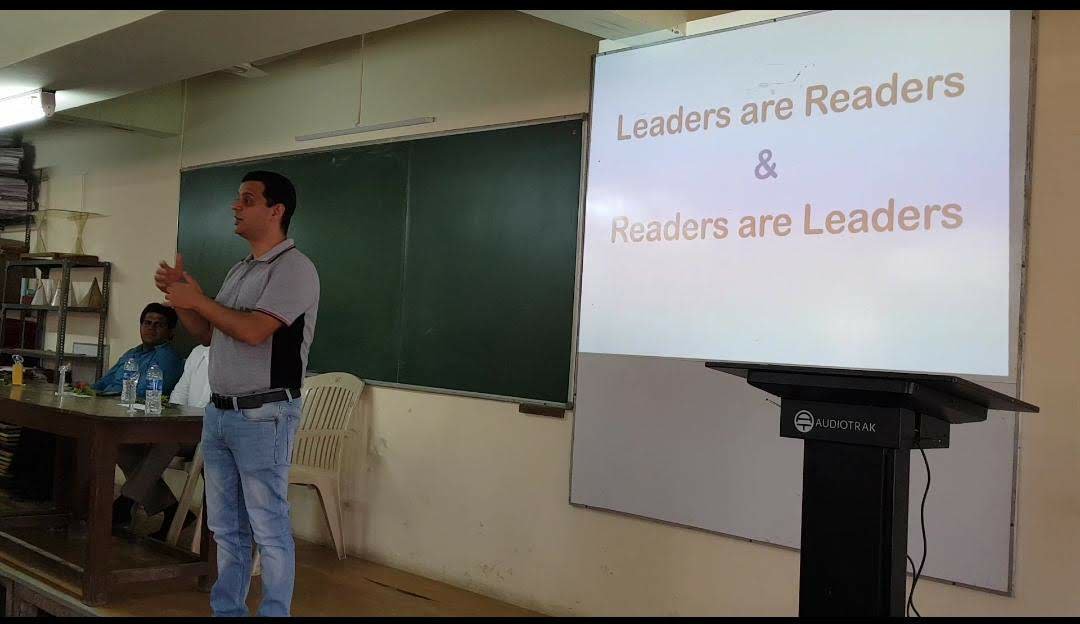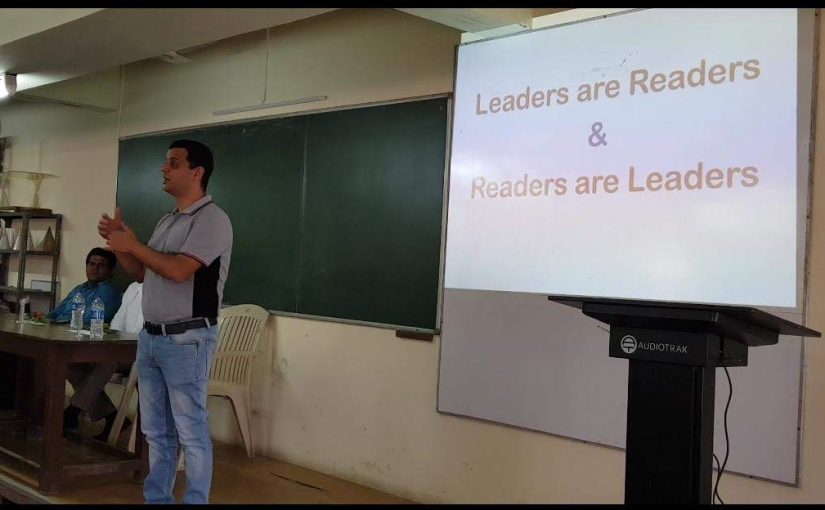If an egg is broken by an outside force LIFE ends. If broken by an inside force, LIFE begins. Great things always begin from inside.
– Jim kwik
Category: Uncategorized
Atomic Habits: An Easy & Proven Way to Build Good Habits & Break Bad Ones
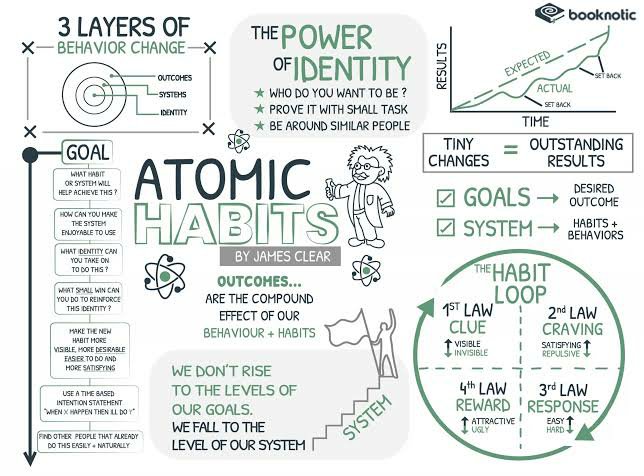
“Your outcomes are a lagging measure of your habits. Your net worth is a lagging measure of your financial habits. Your weight is a lagging measure of your eating habits. Your knowledge is a lagging measure of your learning habits. You get what you repeat.”
Atomic Habits , a breakthrough book from James Clear is the most comprehensive guide on how to change your habits and get better every day. This short note based on the book, is written in two parts. Part one helps us understand the importance of our habits and why they matter. More importantly, it provides answers to a series of “How to” questions that naturally occur in the context of building good habits and breaking the bad ones. In the second part of the note, six important ideas, concepts and principles are summarised that will help the reader in building habits that he or she desires to.
Part One – What ? Why ? How ?
– What is a Habit ?
– Why do Habits Matter ?
– How Habits Work ?
– How To Start A New Habit?
– How to Build Better Habits ?
– How to Break Bad Habits ?
– How to Enjoy Habits that are Hard ?
What is a Habit ?
“Habits + Deliberate Practice = Mastery”
Habits are mental shortcuts. A habit is a routine or behavior that is carried out repeatedly and most of the time automatically. When you are faced with a problem repeatedly, your brain starts to automate the process of solving it. Your habits are sets of automatic solutions that solve the problems you come across regularly.The ultimate purpose of habits is to solve the problems of life with as little energy and effort as possible. A habit is a behavior that has been repeated enough times to become automatic.
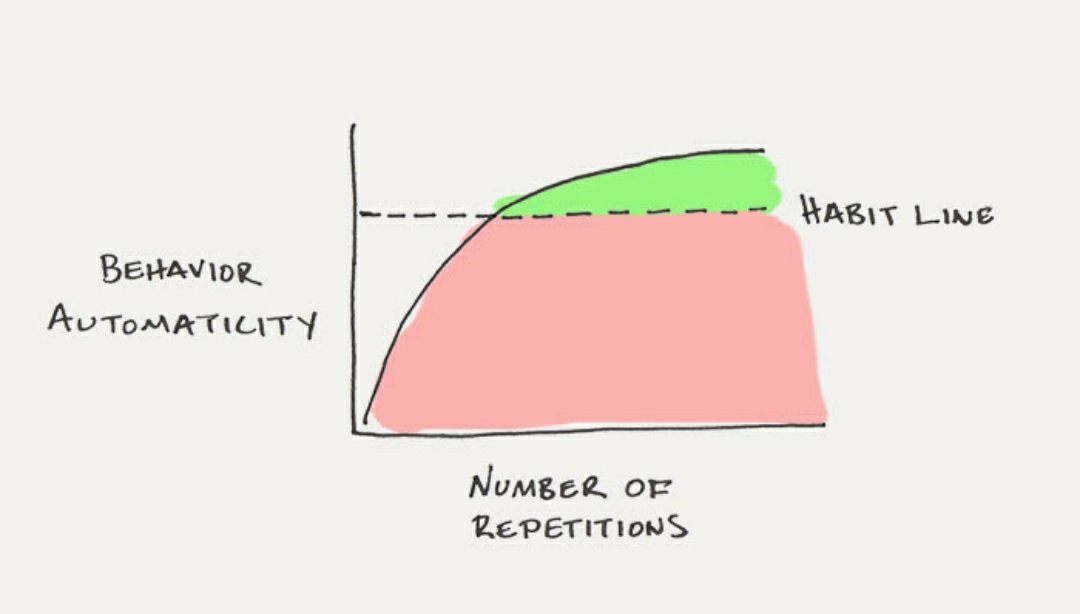
If you find yourself struggling to build a good habit or break a bad one, it is not because you have lost your ability to improve. It is often because you have not yet crossed what James Clear calls, Plateau of Latent Potential. When you finally break through the Plateau of Latent Potential, people will call it an overnight success. Habits are the compound interest of self-improvement.
The upside of habits is that we can do things without thinking. The downside is that we stop paying attention to little errors. Reflection and review is a process that allows you to remain conscious of your performance over time. The tighter we cling to an identity, the harder it becomes to grow beyond it.
Why do Habits Matter ?
IDENTITY -> PROCESSES -> OUTCOMES
Habits shape our identity. Our actions define who we are. Our habits are a reflection of our identity. The more we repeat a behavior, the more we reinforce the identity associated with that behavior. For example: if you make your bed every day, you are reinforcing the identity of someone who is organized and tidy.
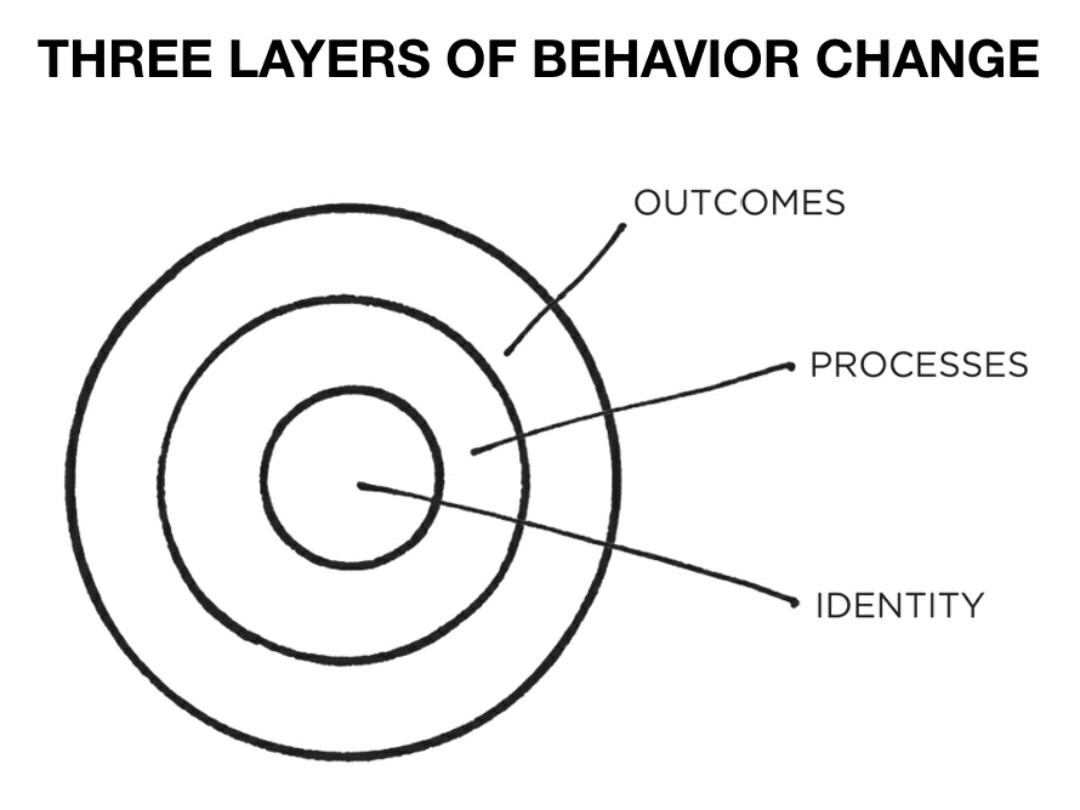
There are three layers of behavior change:
1. Change in your outcomes. This means changing your results, for example, losing weight.
2. Change in your processes. This means changing your habits and systems: for example, developing a daily exercise routine and diet.
3. Change in your identity. This means changing your beliefs: the way you see yourself and the ones around you. For example, if you exercise regularly, you are reinforcing the identity of someone who is fit and healthy.
With outcome-based habits, the focus is on what you want to achieve. With identity-based habits, the focus is on who you wish to become. James Clear argues that the best way to change our identity is to focus on changing our habits. By starting with small, easy habits, we can gradually build up a new identity that is more aligned with our goals. True behavior change is identity change. You could choose and start a habit because of motivation, but you’ll stick with it only if it becomes part of your identity. The real reason habits matter is not because they can get you better results (although they can do that), but because they can change your beliefs about yourself.
How Habits Work ?
CUE -> CRAVING -> RESPONSE -> REWARD
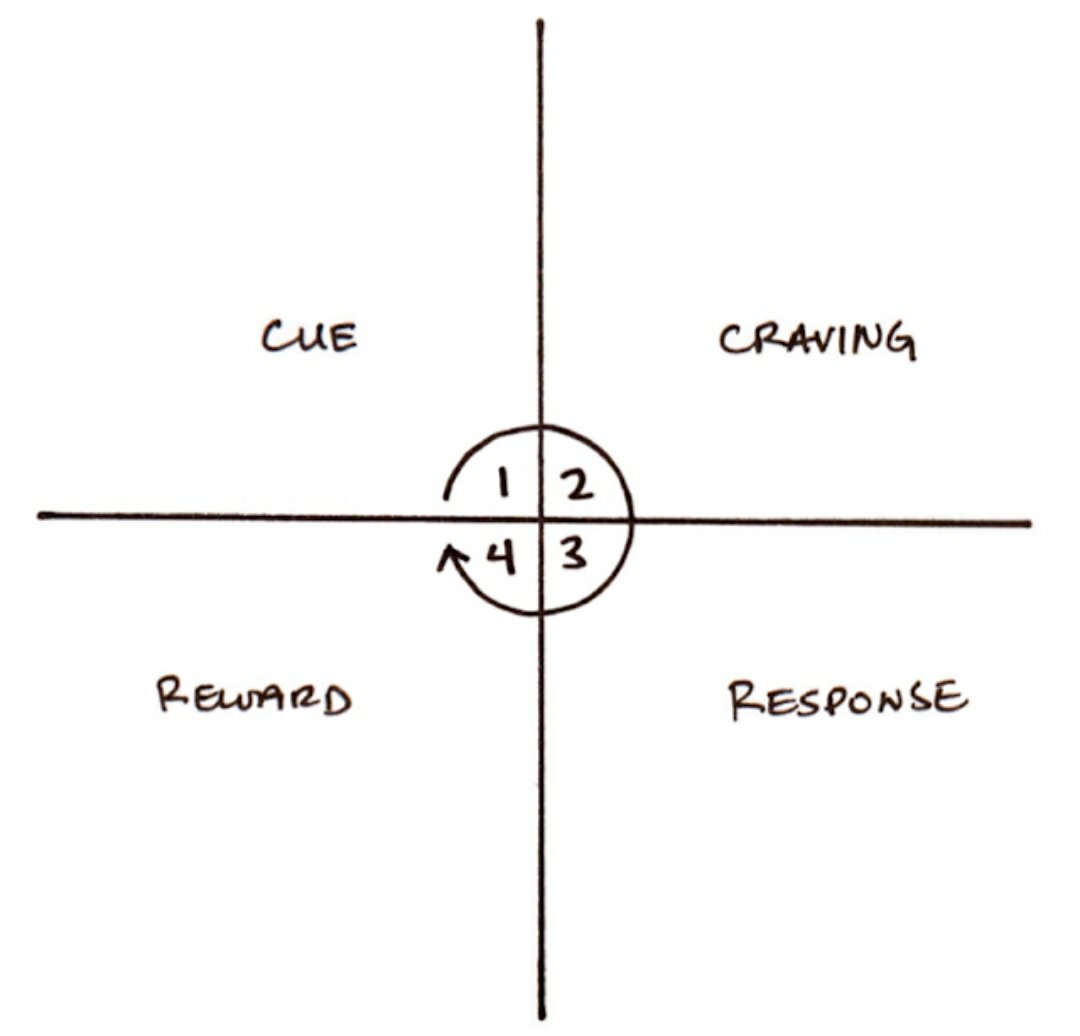
The main components of habit formation are:
1. Cue: It causes your brain to begin a behavior. It is a bit of information that predicts a reward.
2. Craving: It is the motivation behind every habit. Without a desire, we don’t have a reason to act.
3. Response: This is the very habit you perform; it can take the form of a thought or an action.
4. Reward: The end goal of every habit.
Habit formation is the process by which a behavior becomes progressively more automatic through repetition. The amount of time you have been performing a habit is not as important as the number of times you have performed it.You could do something three times in thirty days, or three hundred times. The frequency will always make the difference.
Habits are attractive when we associate them with positive feelings and unattractive when we associate them with negative feelings.
How To Start A New Habit?
‘After [CURRENT HABIT], I will [NEW HABIT].
One of the best ways to build a new habit is to identify a current habit you already do each day and then stack your new behavior on top. This is called habit stacking. The two most common cues are time and location. Creating an implementation intention is a strategy you can use to pair a new habit with a specific time and location. Habit stacking is a strategy you can use to pair a new habit with a current habit.
The habit stacking formula is: ‘After [CURRENT HABIT], I will [NEW HABIT].
Using the Environment to Build New Habits.
Environment is the invisible hand that shapes human behavior. Small changes in context can lead to large changes in behavior over time. Every habit is initiated by a cue. We are more likely to notice cues that stand out. Make the cues of good habits obvious in your environment. Gradually, your habits become associated not with a single trigger but with the entire context surrounding the behavior. The context becomes the cue. It is easier to build new habits in a new environment because you are not fighting against old cue
How to Build Better Habits ?
A habit needs to be enjoyable for it to last. What is instantly rewarded is done again. what instantly punished is ditched. To get a habit to stick You need to feel instantly successful, even if in a small way. The Four Laws of Behavior Change are a simple set of rules we can use to build better habits. For example, If we wish to build a habit of a daily work out, here’s how we can apply this 4 point formula.
1. Make it obvious
Put your gym bag by the door so you see it first thing in the morning.
2. Make it attractive
Listen to your favorite music while you work out.
3. Make it easy
Start your day with a 10-minute walk.
4. Make it satisfying
Write down your progress in a habit tracker.
How to Break Bad Habits ?
Self-control is a short-term strategy when forming habits. You may be able to resist temptation once, but you will most likely not be able to have the willpower to control your desires each time they appear. A better method is to cut bad habits off at the source. For example, if some want’s to get out of the habit of smoking, here’s how he can apply this 4 point formula.
1. Make it invisible.
Hide your cigarettes so you don’t see them every time.
2. Make it unappealing.
Think about how bad your breath smells after you smoking.
3. Make it hard to perform.
Set a goal to work for 25 minutes, even if you don’t feel like it.
4. Make it frustrating.
Remember how bad slacking off feels.
How to Enjoy Habits that are Hard ?
Create a motivation ritual by doing something you really like right before a difficult habit.
Part Two – Ideas, Concepts, Principles
– 1% Improvement Everyday
– The 2-Minute Rule
– The Goldilocks Rule for Staying Motivated
– The Law Of Least Effort
– Walk Slowly, But Never Backward
– Focus on Systems
1% Improvement Everyday
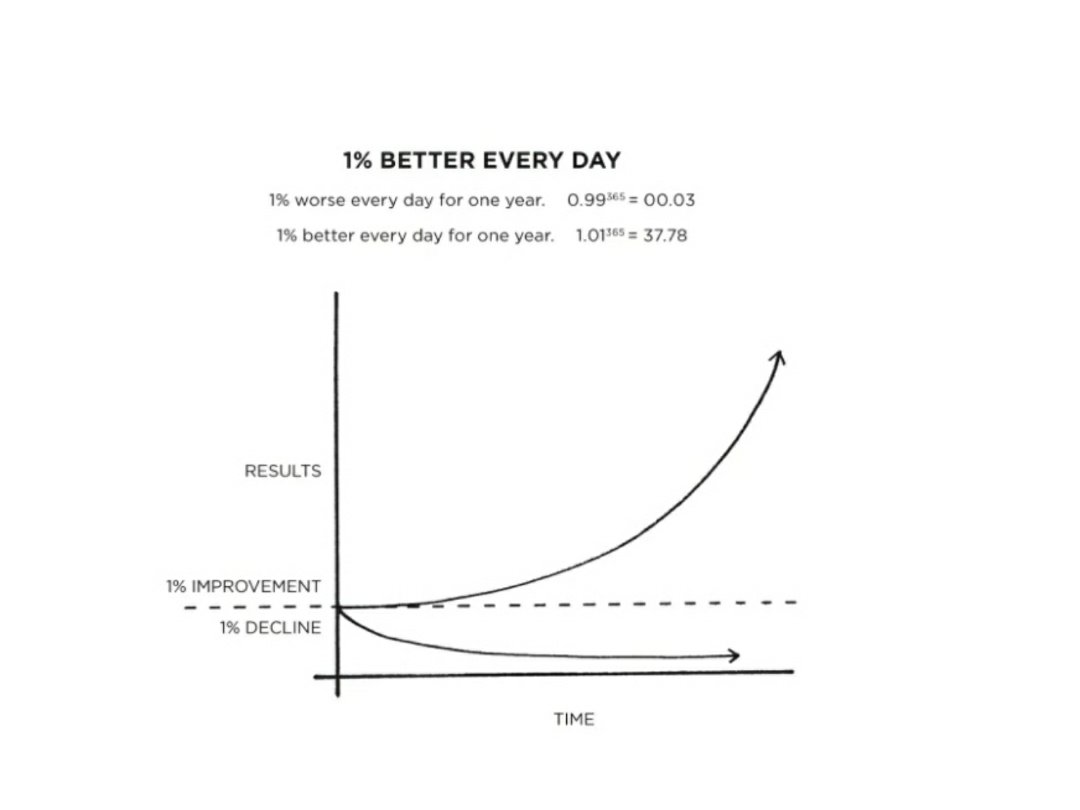
“If you can get 1 % better each day you will end up 37 times better by the time you’re done.
If you get worst 1% every single day end up reaching nearly 0″ – JAMES CLEAR
Getting 1 percent better every day counts for a lot in the long-run. It is about the cycle of endless refinement and continuous improvement. Habits are the compound interest of self-improvement.
The 2-Minute Rule
If you can do an action in two minutes or less, tackle it at the moment — and don’t delay.
The rule was created by David Allen in Getting Things Done & James Clear recommends it for habit building as well: When you start a new habit it should take less than two minutes to do.
Any habit can be scaled down into a 2-minute version:
• Read before bed each night becomes read one page;
• 30 minutes of exercise becomes take out my yoga mat;
• Fold the laundry becomes fold one pair of socks.
The Goldilocks Rule for Staying Motivated
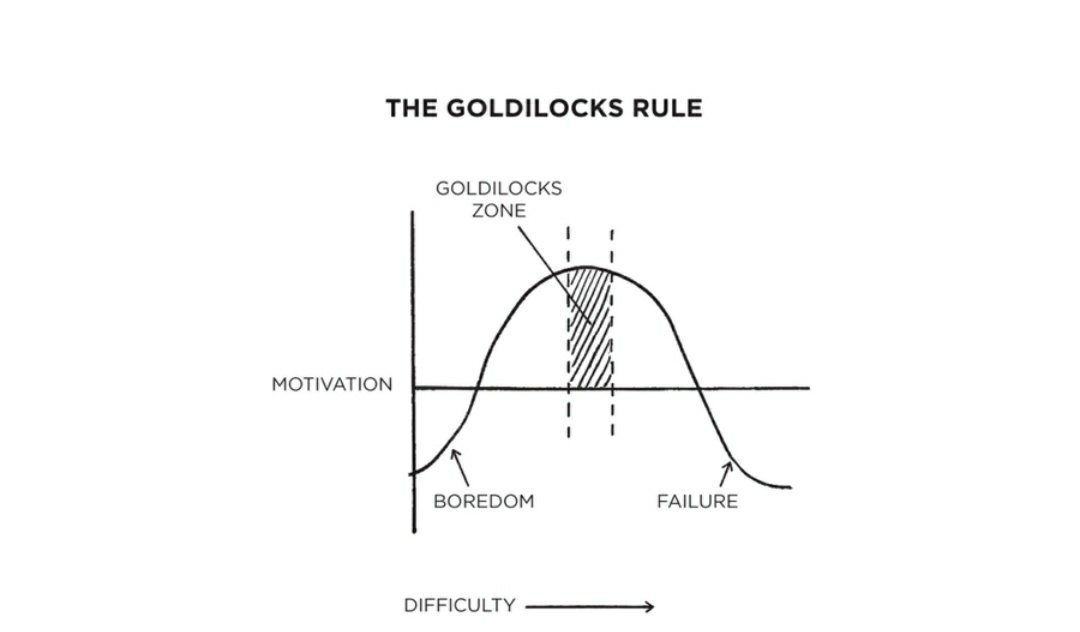
We experience peak motivation when we are performing actions that are right on the edge our current abilities. Not too difficult, not too easy.
The Law Of Least Effort
We will instinctively choose the path that requires least amount of work. This is a universal law that has huge implications in habit formation:
• Create an environment where doing the right thing is as easy as possible.
• Reduce the friction associated with good behaviors. When friction is low, habits are easy.
• Increase the friction associated with bad behaviors. When friction is high, habits are difficult.
Walk Slowly, But Never Backward
It’s easy to get discouraged when you’re trying to change your habits, especially if you don’t see results immediately. But if you keep taking small steps forward, even if they’re not huge, you’ll eventually reach your goals.
For example: if you’re trying to lose weight, you might be tempted to skip a workout or eat a unhealthy meal. But if you do that, you’ll be setting yourself back. It’s better to make small, healthy choices that will help you reach your goals in the long run.
Focus on Systems
Goals are good for establishing a direction, but systems are best for making progress. Goals are about the results you hope to reach. Systems are about the mechanisms that lead to those results.
To conclude, let’s accept that on an average 90% of our daily decisions happen automatically, many shaped by our environment. Thus, most decisions are a habit, not a deliberate choice. Therefore, to make smarter choices, we need to design smarter defaults. And so, habits can be developed by shaping the invisible defaults of life.
In 5 Years From Now, You Will Be….

In 5 years from now, what you will be will depend on the books you read, and the people you meet.
The 5 AM Club

“The 5 AM Club” by Robin Sharma emphasises the importance of rising up early, and beginning your day with a holistic routine. The mantra, “Well begun is half done” is reiterated. The following is an extract, summary from the book, along with a visual representation, and a video link from YouTube both of which are included at the end of this note.
Robin Sharma’s magic mantra from this book, “Take excellent care of the front end of your day, and the rest of your day will pretty much take care of itself. Own your morning.”
He encourages everyone to be an early riser, which is at 5 am in the morning. While this could be difficult for many to adopt, for several personal and professional reasons, in principle the concept can be implemented, so long as one is willing to rise early. It’s important to grasp the ideas presented in the book and implement them, so that one make the most of the time available to advance personal, professional , physical, family, health, spiritual and social goals.
Peak Performance at 5:00 a.m.
The text suggests that our attention span is limited and gets used up throughout the day by various distractions. By waking up at 5:00 a.m., there is an opportunity to focus on one important task without distractions. This is due to a concept called transient hypofrontality, where at this time, the brain’s rational thinking shuts down, allowing for a state of flow. This state of flow leads to increased focus and productivity for the entire day. This can lead to achieving great things and becoming a history maker.
– Move: 1st 20 minutes for intense exercise. Start by exercising vigorously for 20 minutes to generate brain-boosting sweat. It will increase your metabolism rate and your brain will be optimized and you will be able to better focus on work.
– Reflect: Then, spend 20 minutes in deep reflection and solitude, writing your thoughts in a journal to understand your vision and let go of negativity. Here you plan your day or Mediate for clear vision or you may do praying or journaling.
– Grow: Finally, dedicate the last 20 minutes of your first hour to learning; study biographies, psychology, innovation, or listen to audiobooks. Embrace this routine to become a successful member of the 5 AM club.
The Four Interior Empires
• Mind Set: It is the psychological aspect of our being. For example, our thinking.
• Heart Set: It is our emotional intelligence. How good are we at managing our own emotions? What is our relation to others?
• Health Set: It relates to our physical fitness.
• Soul Set: It connects to spirituality. How are we connecting to that Supreme power?
The Five Scientific Truths Behind Excellent Habits
• World-class willpower isn’t an inherent strength; it is a skill developed through relentless practice.
• Personal discipline is a muscle. The more you stretch it, the stronger it gets.
• Like other muscles, willpower weakens when tired. Therefore, recovery is necessary for the expression of mastery and to manage decision fatigue.
• Installing any virtuous habits follows a distinct four-part pattern for automation of the routine.
• Increasing self-control in one area of your life should elevate self-control in all areas of your life.
The Habit Installation Protocol
It takes 66 days to get to the automation point of a new habit. The time can be divided into 3 parts (22 days each)-
• Destruction Phase: Here your old habit gets destroyed. It is the hardest part. You need most of your willpower in this phase.
• Installation Phase: In this phase installation of a new habit takes place. Here you should remember why you are going to build this habit.
• Integration Phase: Here the habit gets integrated with your daily life
After 66 days the habit will be automated.
The 10 Tactics of Lifelong Genius
1. The Tight Bubble of Total Focus: preserves your focus as well as your primal brilliance by giving you long stretches of time free from trivial fascinations and any influences that dissolve your inspiration.
2. The 90/90/1 Rule: For 90 days spend 90 minutes of a workday on a single task.
3. The 60/10 method: 60 minutes work – 10-minute break.
4. The Five Daily Concepts: During the second pocket of your Victory Hour, list the five tiny targets you wish to accomplish over the day ahead for you to feel it was one well-spent.
5. The Second-Wind Workout: schedule a second workout at the end of your workday to give you a second wind for a great evening.
6. The Two Massage Protocols: Lock two ninety-minute massages onto your weekly schedule. If not a massage do something that allows you to unwind.
7. Traffic University: Use the traveling time to learn, expanding your professional prowess and personal knowledge.
8. The Dream Team Technique: Delegate tasks that not only are a poor use of your hours but also diminish your happiness. Ideally, restructure your entire life so you’re doing only the things you’re great at—and love to do.
9. The Weekly Design System: Carve out and then ritualize thirty minutes early each Sunday morning to create your “Blueprint for a Beautiful Week.”
10. The 60-Minute Student: For at least sixty minutes a day, study. Do whatever it takes to fireproof your commitment to relentless growth.
The Billionaire’s Maxim
1. To Create Magic in the World, Own the Magic within Yourself.
2. Collect Miraculous Experiences over Material Things.
3. Failure Inflates Fearlessness.
4. Proper Use of Your Primal Power Creates Your Personal Utopia.
5. Avoid Bad People.
6. Money Is the Fruit of Generosity, Not Scarcity.
7. Optimal Health Maximizes Your Power to Produce Magic.
8. Continue Raising Your Life Standards Toward Absolute World-Class.
9. Deep Love Yields Unconquerable Joy.
10. Heaven on Earth Is a State, Not a Place.
11. Tomorrow Is a Bonus, Not a Right.
The following illustration by Visual Synopsis presents the above concepts in a single sheet.
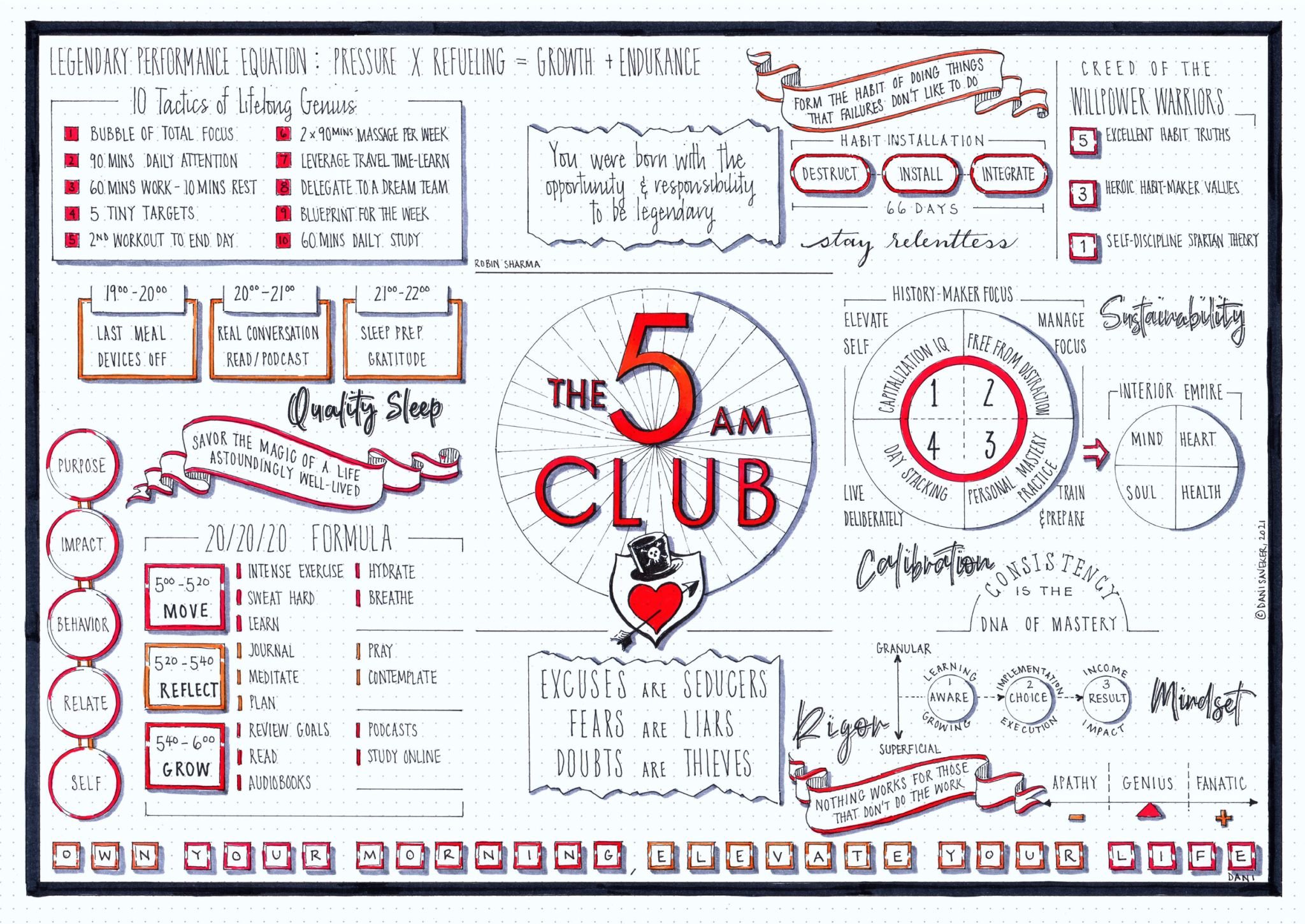
You can also watch the 5 am Club video uploaded on YouTube by Upgraded Mentality.
Secrets of Good Health

This note, titled as “Secrets of Good Health” is a summary from an audio podcast on Audible, from Rujuta Diwekar, one of the most qualified and sought after nutrition and wellness expert. I had the fortune of training for my first marathon under Rujuta, in 2010. In this podcast, Rujuta presents a simple, yet little understood definition of good health. She emphasizes the importance of following a diet and exercise routine which is sustainable over a life time, and staying away from fitness fads or quick fixes. Right through the podcast she provides insights and simple yet effective actionable points that once can follow in the daily routine.
What is Good Health ?
– Good health is about improving the functionality and the quality of our day to day life. It should help us live a happier and a fulfilling life.
– Being fit means feeling light on your feet, healthy and happy in your heart and your head. Fitness is the benefit that you get out of building good habits.
– Good health comes in all weights, sizes and shapes. Don’t confuse between your weight and your health. Each one of us is healthy at a different body weight. Don’t be obsessed about reducing weight.
– Measures of good health are good digestion, sound sleep, good skin and hair, waist to hip ratio
– There is no shortcut to losing weight or getting slim. It requires small, slow, steady and sustainable efforts every day.
The 3 Guidelines on Healthy Diet and Well being:
1. Eat according to your cultural traditions
2. Eat according to your personal preference
3. Eat according to your budgetary constraints
5 Habits for Good Health
Sustainable weight loss means that your reduce 5 to 10% of your current weight within a year. Our focus needs be on building long lasting habits that we can sustain over a long period of 30 to 35 years, and right through life.
1. Don’t stand on the weighing scale every day. Weigh yourself once every 3 months. It’s important to feel light from within even if the weight doesn’t reduce significantly.
2. Don’t follow diets with names, or with the terms such as protein, carbohydrates and fat.
3. Don’t compare your fitness journey with that of others, or your own progress in the past.
4. Don’t kill yourself in the gym. An exercise should make you feel good, improve your energy levels, give you better sleep. Exercise like a real human being. 150 minutes of exercise in week is adequate for good health. You have to make a habit of exercising right through your life.
5. Don’t sleep at night on the next calendar day. Sleep on the same day as you wake up. Try to sleep before 11:30 pm latest.
Don’t fall for food fads of the weight loss industry or fall for their profit making scheme. Common sense is better than every formula or fad. Everything when consumed in an appropriate proportion, and with mindfulness will do good.
A Simple formula to maintain good health is:
1. Eat home cooked food, avoid outside food.
2. Sleep in time, get adequate sleep.
3. Exercise regularly.
Good Food Habits at Home, Work & during Travel
– At Home – Don’t skip or delay your breakfast. Eat a healthy and wholesome breakfast within the first few hours of waking up. There are plenty of breakfast foods in traditional Indian culture. Not eating a good breakfast will result in hunger pangs at the end of the day, where in you end up overeating to match up the calories your body needs.
– At Work – Plan your food intake between 4 to 6 pm. This helps you get the required mental and physical energy to take you through the evening, and will avoid acidity and bloating. There are plenty of evening snack options in Indian culture. You can have nuts, banana, dry snacks or light snack food. If you do not consume anything between 4 and 6 pm, the cortisol level which causes stress increases.
– During Travel – Carry food during your travel. A fruit and or nuts; a sweet like dates, laddoos; a salty snack; a bottle of water. This will help reduce your travel stress as well.
Top Foods for 3 Common Health Issues are Sugar Craving, Acidity and Tiredness.
Maintaining diversity and equality in the food intake is essential for a right balance. The following are the three common health related issues, and the solution to them :
Sugar Craving can be addressed by:
– Intelligent use of spices in cooking. Learn to cook.
– Good use of vegetables, tubers (root vegetables) such as sweet potato, yam, (also arbi, suran)
– Use of peanuts and peanut powder in daily diet.
To prevent Acidity
– Start your day with soaked black resins, which are also naturally sweet.
– Consume curd and poha or rice as a mid meal.
– A glass of water with a spoon of gulkand mixed, to be consumed in small portions right through the day.
To avoid Tiredness
– Aliv seeds, Halim seeds, iron and folic acid containing seeds
– Sprouts and Pulses all types
– Cashews – 4 to 6 cashews, consumed mindfully
Exercise FAQs
– Don’t confuse your activity with your exercise. Exercise is non-negotiable. It helps improve the heart, brain, bones and maintaining the right balance of hormones.
– For reducing belly fat and for a flat stomach increase, build the strength of your lower body, strong legs and your hip muscle. Exercises like squats, lunges, dead lifts.
– Walking 4000 steps in a day are adequate, about 3 to 4 km. This helps in blood circulation.
– Women need to work on building strength in the upper body and back, along with lower body exercises.
– Building strength results in musculature and helps reduce fat.
– All ages are good to begin exercising. Start slow and get steady. Exercise helps reverse aging.
– Exercise right through your life – 30 minutes a day, or one hour every alternate day.
Kid’s Health
– Kids should follow the same diet as adults do. There is not need for very special foods.
– Kids should be kept away from junk food. If there is an ad, it’s bad.
– Height is genetic.
Preventing Stress Eating by Reducing Stress
– Food is interlinked with our emotional well being, moods.
– We don’t need apps to tell us that we have over eaten. Self regulation is important while eating.
– Regular exercise helps reduce stress. Continuous exercise for 30 minutes gives you a dopamine kick, and thus helps reduce stress eating. Exercise at least 4 to 5 times a week.
– A short nap of 30 minutes, before 3 pm every afternoon helps reduce the stress, makes you feel energetic in the evening, and helps sleeping well at night.
– The Cortisol – the stress hormone, naturally comes down around 6 pm every evening. However, if you do not consume anything between 4 and 6 pm, the cortisol level increases.
– Consume coconut, peanut and cashews in your regular diet. Coconut is used in our culture, as it gives physical energy and at the same time calms the mind. Peanuts and cashews give you vitamin B, iron, essential fatty acids and magnesium, and helps reduce stress.
Sleep Matters
– The greatest secret of good health is a sound nighttime sleep.
– It’s important to sleep at the right time, latest by 11:30 pm each day.
– Lack of sleep results poor digestion – bloating, acidity, constipation.
– Post dinner, walk gentle and relaxed 100 steps for a good sleep.
– Hormones such as growth hormone, thyroid and insulin get regulated in sleep. Our growth hormone which makes us feel and look healthy peaks in the night when we sleep.
– Good sleep is important for a good mental health.
– Sleep is important for learning, and mental work.
Don’ts Before Night Sleep
– No tea, coffee, chocolate or any form of caffeine after 6 pm in the evening, as it affects the quality of sleep.
– Don’t listen to any loud noises 2 to 3 hours before sleeping.
– Stay away from screen at least 1 hour before sleep.
– Do not consume any intoxicating substances in late evening, night.
Three Secrets for Good Sleep
– Have a proper dinner, between 7 and 9 pm. There should be a 3 hour gap between bedtime and dinner. Don’t fully avoid carbs at night.
– Have a cup of haldi milk, gulkand milk, or milk with powdered cashews, nutmeg before sleeping.
– A little ghee massage on the soles of the foot before sleeping.
Yoga
– Yoga is not fully understood. Yoga is all encompassing.
– Yoga by definition means a calm mind. Focussing with an aim to achieve excellence.
– Strength, Stamina, Stability and Stretching – the 4 main arms of exercise can be achieved by practicing yoga.
– Practise yoga 3 to 4 times a week, for at least 30 minutes to an hour.
Do’s and Don’ts for Good Digestion
– Finish your lunch with a spoon of ghee and jaggery.
– Have a banana every day.
– Curd and resins should be consumed.
– Be active. Walk, stay mobile.
– Have a quick short afternoon nap.
– Stay hydrated.
– Avoid over dose of tea, coffee. Don’t have tea or coffee after 4 pm.
– Balance your meals with time tested proportion of food.
– Avoid laxatives.
Your Health Assessment
– Assessing health based on body weight only, isn’t the correct approach.
– Waist to Hip Ratio signifies good health (0.7 to 0.8 in females, 0.9 – 1.0 in males).
– Male waist less than 40 inches, female waist less than 36 inches.
– Digestion assessment.
– Sugar Craving assessment.
– Exercise compliance – exercise 3 to 5 times a week.
– Sound night time sleep.
– Minimal pain during monthly periods for women.
Thank you Rujuta for sharing your secrets of good health.
This is the Only Time…
25th March, 2020
Japji Sahib, The Mool Mantar

Love, Sex And Marraige
A section of the book talks about the emotions of Love, Sex and Marriage. His explaination of love is unparalleled. His articulation of the connect, between the emotions of Love, Romance and Sex are thought provoking. His views on the balances in a marriage are worth a read.
Back in time, when the book was penned, there were only a handful of successful and famous women in the society. Therefore the last part of the note is limited to his study of the lives of successful men. He emphasises upon the powerful influence of the women in a man’s life.
How much of the author’s views hold true in the modern day context is for every reader to decide, based on his or her own experiences.
Love
Love is without question, life’s greatest experience. Memories of love never pass.
“The effect of love endures, because love is spiritual in nature. Even the memories of love are sufficient to lift one to a higher plane of creative effort. Bathe your mind in the beautiful memories of past love. They will soften the influence of present worries, unpleasant realities of life.
The Emotions of Love, Romance and Sex
Love, Romance and Sex are all emotions capable of driving men and women to heights of super achievement.
“Love is spiritual, while sex is biological. Emotion of sex is most intense and powerful of all mind stimuli.
The Balances in a Marriage
Marriages not blessed with eternal affinity of love, properly balanced and proportioned with sex, cannot be happy, and seldom endure.
“Love alone will not bring happiness in marraige, nor will sex alone. When these two beautiful emotions are blended, marraige may bring out a state of mind, closest to the spiritual that one may ever know.”
Successful Men, & The Women in their Lives
Men are easily managed by the women of their choice
कोशिश करने वालों की कभी हार नहीं होती – हरिवंश राय श्रीवास्तव “बच्चन”
You Are Your Own Start Up
